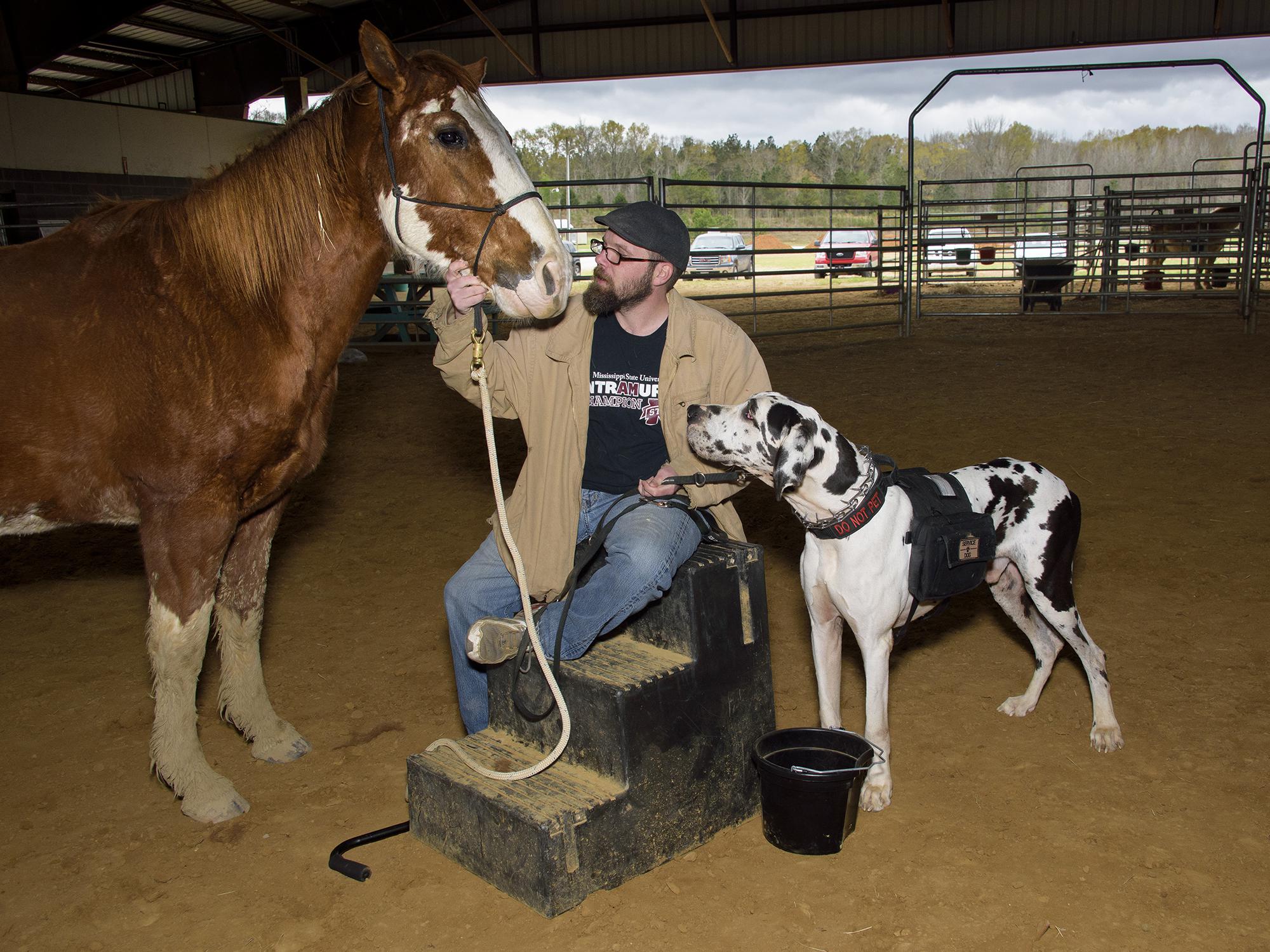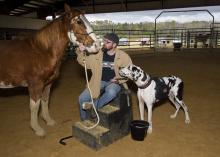Information Possibly Outdated
The information presented on this page was originally released on April 19, 2018. It may not be outdated, but please search our site for more current information. If you plan to quote or reference this information in a publication, please check with the Extension specialist or author before proceeding.
Horses provide valuable support to local veterans
WEST POINT, Miss. -- The groundwork portion of therapeutic horseback riding offers emotional and mental benefits to veterans who take part in a program at Mississippi State University.
Lance McElhenney of Webster County served in the U.S. Marine Corps around the world. Injured by a mortar fragment in Iraq in 2004, this Purple Heart veteran now fights a different battle -- with multiple sclerosis. One of his weapons is an old horse he named Archie, for Archibald Henderson, the grand old man of the Marine Corps.
“The bond with Marines is unlike anything else -- like family -- it cannot be matched,” he said. “Horses seem to feel the same for their people. Those trusting relationships form on the front end of the program when we are doing groundwork and before we ever get into a saddle.”
McElhenney took part in the MSU Therapeutic Riding program for veterans and now returns to offer encouragement to other participants and to see his equine friend, who still likes to cuddle.
“I love the people and the purpose of this program. It is important to have good program leaders who understand your needs,” he said.
One of those program leaders is Lori Irvin, a former social worker whose father spent 43 years in active military duty. She has found her dream career working with veterans and other participants in the therapeutic riding programs offered by the MSU Extension Service.
“Everyone enjoys riding, but it is the groundwork that seems to really make a difference. It’s a bonding experience,” she said. “The horse and the veteran learn each other’s body language. They learn how to communicate without force.”
Cassie Brunson, coordinator of the MSU Extension Service Therapeutic Riding and Activity Center in West Point, said the groundwork emphasizes “natural horsemanship” techniques.
“The time on the ground is quiet and peaceful. Grooming and walking side by side together helps process emotional challenges many veterans face,” she said. “They spend five weeks on the ground getting to know each other, then five weeks both on the ground and in the saddle.”
Brian S. Locke, director of the MSU Center for America’s Veterans, said he was “fascinated with the idea” when Extension Service representatives approached him about the program.
“We are always looking for new, innovative ways to help veterans on campus,” Locke said. “Now, this is one of our favorite programs for student veterans. The feedback is absolutely positive.”
Locke said he knows of no other university conducting a similar program for student veterans.
“We are working hard to get the word out to our students. When they are going to college, veterans have a lot of distractions such as jobs, family and other obligations,” he said. “They may not realize this program is available or how much it could help them transition from active service to higher education.”
Brunson said the program welcomes volunteers and donors to enable them to reach more veterans and other participants.
“Typically, we have eight enrolled in our veterans program, and another 30 each semester for therapeutic riding,” she said. “Every rider has several trained volunteers assigned to ensure their safety.”
Brunson said the relationships that form in the arena are the bright spots for everyone’s day.
“The instructors, volunteers, participants, spectators and even horses enjoy their time at the 4-H Elizabeth A. Howard arena,” Brunson said. “In a hectic world when so much is beyond our control, horses provide the perfect solution.”
For more information on the MSU therapeutic riding programs, contact Brunson at cbrunson@humansci.msstate.edu.
Interested in supporting the MSU Equine Assisted Therapy Programs?
Make a gift by clicking here.


